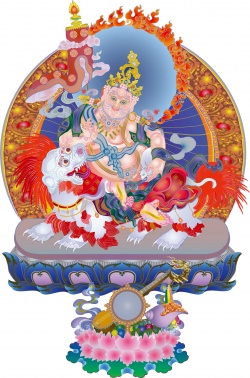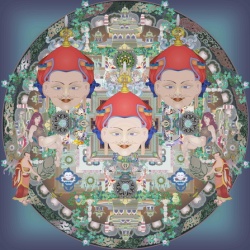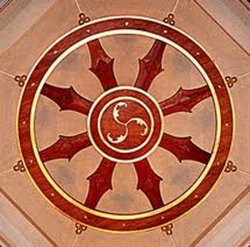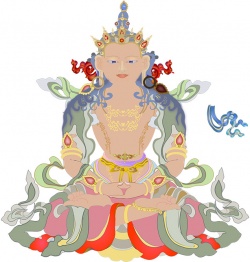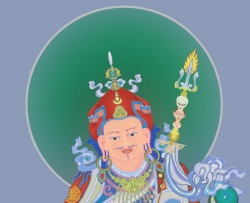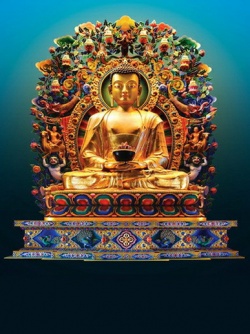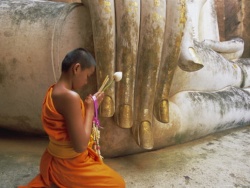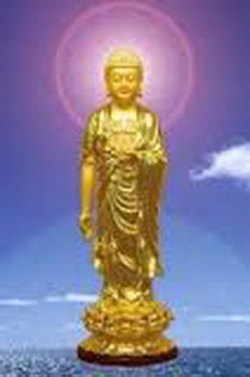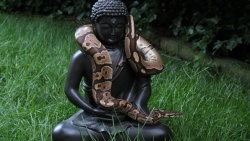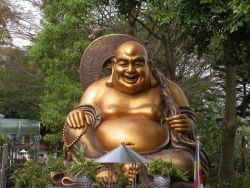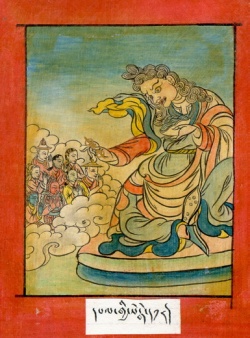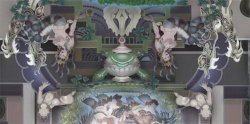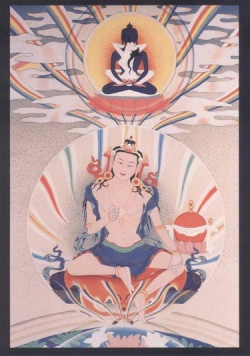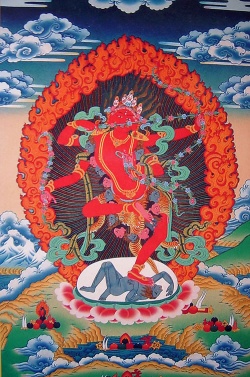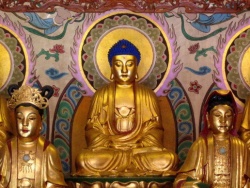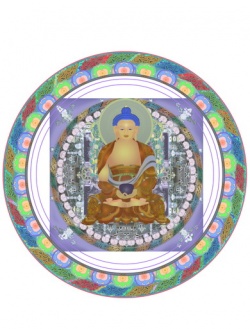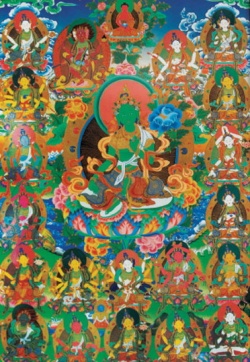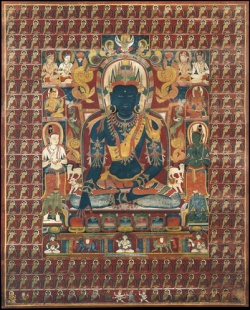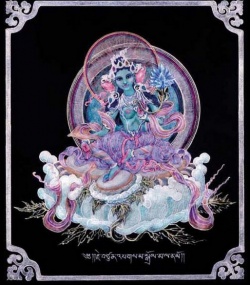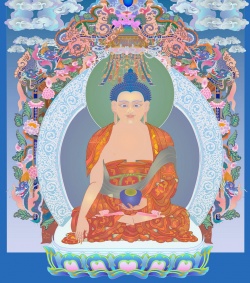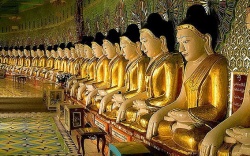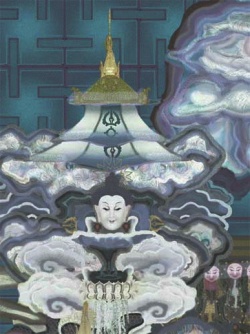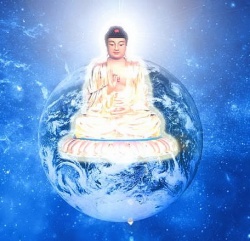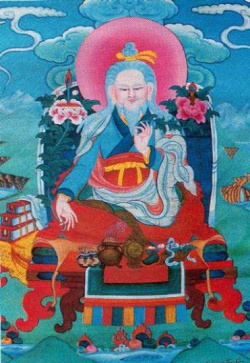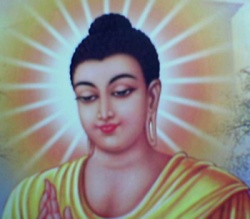Meditation, Spiritual Practices, and the Way
Beloved:
There is nothing that can be gained from reading itself.
..........
"In the Pursuit of learning one knows more every day, in the pursuit of the Way one does less every day. One loses every day until one does nothing at all, and when one does nothing at all there is nothing that is left undone. It is always through not meddling that the empire is won. Should you meddle, then you are not equal to the task of winning the empire." - Lao Tzu
The secret of the Way: Refine Your breath and breathe ONE. Exhale Love. Breathe Love. LOVE is the Way. That is all.
True growth comes from experience. What is gained and what is lost? What is true and what is false? What is real and what is unreal? That can only be Judged by you; and when you go beyond those pairs of seeming opposites, and experience and know from where these and all else comes, You will know yourself.
Meditation: a way, a practice, or is it life? You find out. No one can tell you. Don't try to get answers from what is written here. Seek beyond the words for their meanings. Their source holds the key, the key to Your own experience. Take from what comes here, and from the rest of life, those things for which you have an affinity, a harmony, a ringing of the bell of Soundless Sound. Take from these pages a sense of where the words come from and where they lead, what they truly are.
"You get more stinkin' from thinkin' than you do from drinkin', but when you feel you know it's real." - Joe Miller
Yet as unreal as these words are, they also are very real and point out the way. But it can't be found in their intellectual meaning or definition. It must be found in the blank spaces between the sounds. A Zen Roshi was asked by a traveler, "What is the secret of the Path?" He answered, "Attention". This is your work. But don't be like that traveler who, wanting more, asked again, so the Roshi replied, "Attention, attention" ; and on wanting an explanation of that, was told, "Attention, attention, attention".
Find your breath. Read with your ears. Sense with Your heart. Feel and be felt, There is a saying that "a book is like a dead teacher". Fortunately, like a dead teacher, writings and sayings can be a connecting link, touching a feeling which leads to the Way. For you, your own way, Your own breath - the One - follow it.
Quiet thought / follow breath / easily relax / no force / flow. In breath Joy. Out breath Peace. Look within for the answers that you seek. There is one guide and that is the guiding spirit within each one. E X P E R I E N C E .
"A certain Bektashi dervish was respected for his piety and appearance of virtue. Whenever anyone asked him how he had become so holy, he always answered: "I know what is in the Koran."
One day he had just given this reply to an enquirer in a coffee-house, When an imbecile asked: "Well, what IS in the Koran?"
"In the Koran," said the Bektashi, "there are two pressed flowers and a letter from my friend Abdullah." - Sufi story (Idries Shah)
Section 2
There was a city in which all the inhabitants were blind. One day a king arrived with a great elephant. As the inhabitants did not know what an elephant was, some of the sightless went forth to find out. They did this by each touching part of the elephant. Each thought that he knew what it was, because he could feel a part.
When their fellow citizens asked about the shape of the elephant, each one who touched it spoke. The man who touched the ear said, "It is a large, rough thing, wide and broad, like a rug." The one who had felt the trunk said," It is like a straight pipe: hollow, awful, and destructive." The one who had felt its leg said, "It is mighty and firm, like a Pillar."
Each had felt one Part out of many. Each had perceived it wrongly. No mind knew all: knowledge is not the companion of the blind. All imagined something, something incorrect.
The eye of sense is only like the palm of the hand: the palm has not the power to reach the whole of the elephant. The eye of the Sea is one thing, and the foam another: leave the foam and look with the eye of the Sea." - Hakim Sanai
There are many meditations: an infinite number. Yet there really is only one meditation. It is the heart made manifest - and beyond. It is the mind knowing and seeing the soul reaching into the silence of the sound - and more. It is the One. Be this, in life, in practice. For is there any practice, or is all practice life? Seek not beyond, seek not within; Be.
You are meditating when you are not aware you are meditating. If you are aware of yourself you are not meditating. If you try you are not doing. If you do you are not trying. If you are yourself you are meditating. If you are trying to be yourself you are not meditating. If you are sitting in posture and waiting you are not meditating. If You drop your glasses, or step on a hole, or jump across a wide ditch, you are meditating. If you are forcing yourself to focus you are not meditating.
R E L A X . Breathe out. Sound whewww. Relax. Breathe out. Sound HUUUU. Let it reverberate in the heart. Relax.
"When one goes to Obaku temple in Kyoto he sees carved over the gate the words, "The First principle". These letters are unusually large, and those who appreciate calligraphy always admire them as being a masterpiece. They were drawn by Kosen two hundred years ago.
When the master drew them he did so on paper, from which workmen made the larger carving in wood. As Kosen sketched the letters a bold pupil was with him who had made several gallons of ink for the calligraphy and who never failed to criticize his master's work.
"That is not good," he told Kosen after the first effort.
"How is that one?"
"Poor. Worse than before," pronounced the pupil. Kosen patiently wrote one sheet after another until eighty-four First Principles had accumulated, still without the approval of the pupil.
Then, when the young man stepped outside for a few moments, Kosen thought: "Now is the chance to escape his keen eye," and he wrote hurriedly, with a mind free from distraction: "The First Principle."
"A masterpiece," pronounced the pupil." - Zen story (Paul Reps)
"The only sin is tension. " - Samuel Lewis (S.A.M.)
Section 3
"THE MEDITATION OF THE HEART: This meditation is a difficult task; for it is not of the body, neither is it of the mind. It is not associated with chakra-concentration. It has nothing to do with the complexities of any school. It is not like any process in intellectualization. Its very simplicity is its difficulty. This meditation is a simple task: there is nothing about it that a child cannot do. Indeed by becoming as little children we may be more successful.
The heart is heart and nothing else. Yet it is more than flesh, even more than feeling. The Master has always said, "Thus," whereupon the disciples have said " thus and thus," including their doctrines concerning the Master with the teachings of the Master. In every time, in every place have teachings and doctrines conflicted, so there has been turmoil, tribulation, warfare - so many doctrines, each opposing the others, all opposing the teachings.
When shall we turn? When shall we return to the heart? When shall we resume the teachings and discard the doctrines? Let us turn, in silence let us turn to the heart, let us seek the secret asylum of the heart, for therein lies the city of refuge, great beyond conception, there is repose, there is salvation.
Seated in quiet comfort, laying aside woes and cares and problems, placing thoughts outside of consciousness, raising consciousness above thought, feel the love that emanates from the sun-centre of the heart. Feel this love, find this love, follow this love - that is all, that is the simplicity, the ever-so-easy meditation of the heart. Thus the baptism in the bosom of Christ, this is tauba. this is shuvo, this is repentance, this is the Way toward Love." - S-A-M-
THE ACCIDENT: There was a seeker of God who sat in the street doing his daily practices. Along came a woman who, engrossed, tripped over the aspirant. The monk cried out in anger, "Stupid woman, can you not see that I am in the road? I deserve great respect and merit, for I am a seeker of the Beloved." The woman replied, with honest contriteness, "Oh, I am so sorry, I was on my way to the house of my fiancée and all my thoughts were on him, to the extent that I noticed nothing else."
What way Buddha Breath? Chant: GATE (Pronounced gatay) GATE, PARAGATE, PARASAMGATE, BODHISVAHA. Go. Go. Go beyond. Go beyond even the beyond. To oneself. Be. Breath taken in, breath released, Be. Sound taken in, sound released, Be. Heart taken in, taken in heart, Be. Sound. Feel.
"INCHANT: "GOOD" a sound is heard / also is self-made / a pre sound heard / initiates the inner life. We approve of us. There must be some deep reason for this. INsing some silent word on breaths. "what word"? any word is good as you make it so. Perhaps Good or Good, GOOD, GOOD, - Reps
What is it on which one can depend? Light to light, heart to heart, sense to sense within, without, one knows. Do You know? You do know. Know - you do. You know you do. Listen. Know. Do.
"Love" is a word of many meanings because love itself has as many phases as there are grades of consciousness. Now, consciousness is the divine life in us, and the Particular phase of consciousness we are "in" at any moment of time is determined by the degree of our awareness or that life which, in turn, determines the quality of our love.
A realization of this is necessary to any understanding of the mystery of love, of all mysteries most profound: a bottomless abyss, a heaven piercing peak, and at the same time a "path" from that depth to that height which everyone must tread - for the path of love is not other than the path or life. " - Claude Bragdon
Section 4
"Thou shalt love the Lord Thy God with all thy heart, and with all thy soul, and with all thy mind. This is the first and great commandment. And the second is like unto it, Thou shalt love thy neighbor as thyself. On these two commandments hang all the law and the prophets." - Jesus
If you look for a practice, breathe love. If you seek a way, breathe love. Let inspiration fill you, let expiration fill yourself with love. Be led, be taught, be opened. HOW? By love. To that guru of gurus, that breath of breaths, to the Way, the Truth, Oneself. Breathe love, Be love, Love. Be.
"The kingdom of heaven is within you. Seek first the kingdom of heaven and all things shall be added unto this. " - Jesus
These things I do, and so shall you do, and even greater things than these. " - Jesus.
"I understand," said the savaka, "that the story of the Western Paradise is not literally true." "Your description of paradise," the Buddha continued, "is beautiful; yet it is insufficient and does little justice to the glory of the pure land. The worldly can speak of it in a worldly way only; they use worldly similes and worldly words. But the pure land in which the pure live is more beautiful than you can say or imagine.
However, the repetition of the name Amitabha Buddha is meritorious only if you speak it with such a devout attitude of mind as will cleanse your heart and attune your will to do works of righteousness. ... He only can live and breathe in the spiritual atmosphere of the Western Paradise who has attained enlightenment. ...
There are five meditations.The first meditation is the meditation of love in which you must so adjust your heart that you long for the welfare of all beings, including the happiness of your enemies.
The second meditation is the meditation of pity, in which you think of all beings in distress, vividly representing in your mind their sorrows and anxieties so as to arouse a deep compassion for them in your soul.
The third meditation is the meditation of Joy in which you think of the prosperity of others and rejoice with their rejoicing.
The fourth meditation is the meditation on impurity, in which you consider the evil consequences of corruption, the effects of wrongs and evils. How trivial is often the pleasure of the moment and how fatal are its consequences.
The fifth meditation is the meditation on serenity, in which you rise above love and hate, tyranny and thraldom, wealth and want, and regard your own fate with impartial calmness and perfect tranquility.
A true follower of the Tathagata founds not his trust upon austerities or rituals, but giving up the idea of self relies with his whole heart upon Amitabha, which is the unbounded light of truth. " - Buddha
Section 5
"A university student while visiting Gasan asked him:"Have you ever read the Christian Bible?"No, read it to me, "said Gasan.The student opened the Bible and read from St. Matthew:"And why take ye thought for raiment? Consider the lilies of the field, how they grow. They toil not, neither do they spin, and yet I say unto you that even Solomon in all his glory was not arrayed like one of these. ... Take therefore no thought for the morrow, for the morrow shall take thought for the things of itself. "
Gasan said : "Whoever uttered those words I consider an enlightened man. "
The student continued reading: " Ask and it shall be given, seek and ye shall find, knock and it shall be opened unto you. For everyone that asks, receives, and he that seeks, finds, and to him that knocks, it shall be opened. "
Gasan remarked: " That is excellent, Whoever said that is not far from Buddhahood. " - Zen story ( Reps )
"Blessed are the poor in spirit; for theirs is the kingdom of heaven. Blessed are they that mourn for they shall be comforted. Blessed are the meek; for they shall inherit the earth. Blessed are they which hunger and thirst after righteousness; for they shall be filled. Blessed are the merciful; for they shall find mercy. Blessed are the pure in heart; for they shall see God. " - Jesus
"Nan-in received a university professor who came to enquire about Zen. Nan-in served tea. He poured his visitors cup full, and then kept on pouring. The professor watched the overflow until he could no longer restrain himself. "It is overfull. No more will go in." "Like this cup," Nan-in said, "you are full of your own opinions and speculations. How can I show you Zen unless you first empty your cup?" - Zen story ( Reps )
"Two monks were arguing about a flag. One said, "The flag is moving." The other said, "The wind is moving." The sixth patriarch happened to be passing by. He told them: "Not the wind, not the flag; mind is moving."
Mumon's comment: What did the sixth patriarch mean? If you understand this intimately, you will see the two monks were trying to buy iron and gaining gold. The sixth patriarch could not bear to see those two dull heads, so he made a bargain.
Wind, flag, mind moves / the same understanding. When the mouth opens / all are wrong." - Zen Koan ( Reps )
Section 6
"Heaven and earth are enduring. The reason why heaven and earth can be enduring is that they do not give themselves life. Hence they are able to be long-lived. Therefore the sage puts his person last and it comes first, treats it as extraneous to himself and it is preserved. Is it not because he is without thought of self that he is able to accomplish his private ends?" - Lao Tzu
"Once a lover came to his beloved's house. He knocked on the door. "Who is there?" the Beloved asked. The man answered, "It is I, your lover." "Go away," said the Beloved, "for you are not really in love."
Years passed, and again the lover came to the door of the Beloved's house and knocked. "Who is there?" asked the Beloved. This time the man answered, "It is you." "Now that you are I," replied the Beloved, "You may Come in." - Rumi
There was a football player who learned his play book very well. When he went to another team he had to relearn all the plays by the new names they called them. He learned them very well. It did nothing for his ability to play football.
Breathe in. Breathe out. Listen. What sound is the breath on breathing in? What sound is the breath on breathing out? Is it amma, abba, amen, sat naam, allah, rama, aum, aaa, uuu, something else?
Refine the breath. In. Out . Does it make a sound? Relax. Listen. What does it call to you? What is your Name, Oh God? What does it matter? Go beyond the name. Be led into the sound. Fall into it. Sound it. In. Become it. Out. Expand into it until out becomes in. Or, stick fingers in ears. Hear. Be.
"I do my utmost to attain emptiness: I hold firmly to stillness. ... Returning to ones roots is known as stillness. This is what is meant by returning to one's destiny."-Lao Tzu
"In concentrating your breath can you become as supple as a babe? Can you polish your mysterious mirror and leave no blemish? ... When your discernment penetrates the four quarters are you capable of not knowing anything?" - Lao Tzu
To know Tao is not as good as to love it, and to love it is not as good as to practice it. - Confucius
"Can we refuse to be pleased with kindly advice? But what matters is meditation. If a man is pleased with advice but will not meditate on it, or if a man follows admonition but does not reform, I do not know what to do with him. " - Confucius
Section 7
All action is meaningless without devotion. All gain in reality comes through Grace - not one's own action.
A practice to do while reading the next section: Keep the mind quiet. Breathe a breath. Watch it. Be thankful for it. Love. Let the breath of love and thankfulness grow as you read the following. Be-ing great-full of Grace, can you make your own life? Breathe in thank-full-ness and love . Breathe out love in Grace.
(Sometimes a "key" to get started breathing love is to consider something, anything at all, from which you get the feeling of love. After that feeling gets stronger by concentration, let the "starter" go, and focus solely on the feeling. Then let the feeling grow. Remember, the heart is more than just an organ of the body").
"Grace is one thing and effort is another. The prophets did not achieve the station of prophethood through effort; they found that good fortune through grace. However, God's Will requires that whoever achieves prophethood live out his life in striving and virtue. " - Rumi
"A single mote of grace's shadow is better than a thousand efforts of the obedient servant",... - Rumi
Now of all these practices and meditations as practices, none can deliver you all the way to the goal of self realization, liberation, and freedom from the "wheel" of karma - in and of themselves. This must come through the attunement of the heart and breath in a very real, continuous way. This must come through the polishing of the mirror of the mind until no dust of thought remains; from the cleansing of intentions and desires until the heart is pure and actions follow naturally; through the abandonment of attachments of what one thinks one is, until one becomes oneself.
If one were to consider the value of meditation, it is not in the practice of sitting or doing in a limited time or space. It is rather in the extension of that meditation or practice to all things in life at all times. Through meditations of a short nature, these practices begin to expand, to consume the dross of human frailties until one can come to be human again.
"What is important in meditation is the quality of the mind and the heart. It is not what you achieve, or what you say you attain, but rather the quality of a mind that is innocent and vulnerable. Through negation there is the positive state. Merely to gather, or to live in, experience, denies the purity of meditation. Meditation is not a means to an end. It is both the means and the end. The mind can never be made innocent through experience. It is the negation of experience that brings about that positive state of innocent. Meditation is the ending of the thought, not by the meditator, for the meditator is the meditation. If there is no meditation, then you are like a blind man in a world of great beauty, light, and color.
Wander by the seashore and let this meditative quality come upon you. If it does, don't pursue it. What you pursue will be the memory of what it was - and what was is the death of what is. Or when you wander among the hills, let everything tell you the beauty and the pain of life, so that you awaken to your own sorrow and to the ending of it. Meditation is the root, the plant, the flower and the fruit. It is words that divide the fruit, the flower, the plant, and the root. In this separation action does not bring about goodness: virtue is the total perception." - Krishnamurti
Section 8
"If your mind is empty it is always ready for anything; it is open to anything. In the beginner's mind there are many possibilities; in the expert's mind there are few." - Shunryu Suzuki
"All the states of higher realization can be attained even in full activity. Trance is not essential - it can be used, but by itself cannot lead to the change of consciousness which is our object, for it gives only an inner subjective experience which need not make any difference in the outer consciousness. There are plenty of instances of people who have fine experiences in trance but the outer being remains as it was. It is necessary to bring out what is experienced and make it a power for transformation both of the inner and the outer being. But it can be done without going into samadhi in the waking consciousness itself. Concentration of course is indispensable." - Sri Aurobindo
Practice is practice. Living is living and contains all practice. It is important to learn the aspects to put them into a united life; which is a unified pattern of living in perspective, harmony, and balance.
There have been stories and accounts of enlightenment and realization, or samadhi, kensho, union, through sitting and "meditating". However all these are just experiences of the time. It is necessary to assimilate them within the be-ing, to put them, and more, into practice in the daily life, and to maintain the balance of consciousness of the One with the consciousness of the world as one.
This takes practice: practice living, practice breathing, practice loving; until one becomes oneself in all that one does. There is liberation - freedom, at this point.
"Reading about enlightenment is like reading about nutrition when you are hungry. Will that fill your belly? Obviously not. Only when you taste, chew, and swallow the food do you feel satisfied, and this is comparable to enlightenment, or awakening. But even then the food you have taken will not nourish you until digestion takes place. In the same way, until you have integrated into your daily life what you have perceived, your awakening is not working for you yet - it will not transform your life. And just as the final step in nutrition is elimination, so one must eventually rid oneself of the notion "I am enlightened." Only then can you walk freely between heaven and earth."
Now suppose your foot itches. Does it feel better to scratch your bare foot or to scratch the itch through your shoe? Reading about enlightenment is like scratching an itch through your shoe." - Philip Kapleau
"There is no beginning to practice or end to enlightenment, and there is no beginning to enlightenment or end to practice." - Dogen
If one asks if he can reach liberation he or she still lacks faith and does not yet know the Way. If one says he can tell you what it is, he also does not know. It is like the story of the town with a wall around it. People in this town said that one would find the truth of the world by going over the wall. However any time one went over, that person never came back. Finally a man decided to go over the wall with two ropes tied to his feet. Two strong friends held the ropes. After the man went over the wall they pulled him back. Then they anxiously asked him what the secret was. Unfortunately, the man had been turned blind, deaf, and mute and could not answer.
Now many preach this sort of thing as a-reason for not speaking and therefore are able to hide (they think) their lack of realization. It is true that one cannot describe reality; however, one can give a sense of what it is like, and can give methods to attune to it or parts of it until the seeker "catches it". You see, "It can't be taught, it's got to be caught" and only you can catch it for yourself.
Section 9
"The way that can be spoken of is not the constant way; the name that can be named is not the constant name. The nameless was the beginning of heaven and earth; the named was the mother of the myriad creatures. Hence always rid yourself of desires in order to observe its secrets: but always allow yourself to have desires in order to observe its manifestations. These two are the same but diverge in name as they issue forth. Being the same they are called mysteries, mystery upon mystery - the gateway - of the manifold secrets." - Lao Tzu
Listen to the sounds. Watch your breath. Feel it. Breathe in Love and thank-full-ness. Breathe out love in Grace. Go beyond the sounds to the sound. Now "catch it".
"The sun's rays shine on all alike; he who would feel their warmth upon his skin must leave the shut-in cave and seek the open air. He who would experience the Divine Compassion in his soul must leave the cave of self and seek the wider being. He must strive upwards, outwards, from his self, breaking the barriers til the homeward-flowing tides are felt and sweep him off his feet." - Bhagavad Gita
"Life comes to an end at the previous thought; it is resuscitated at the subsequent thought." - Shan-tao .
"I thought of You so often that I completely became You. Little by little You drew near, and slowly but slowly I passed away." - Rumi
"The beloved sat facing my open heart for so long that, but for Her Attributes and Nature, nothing remained of my heart." - Maghrebi
"TO FIND GOD: During every little period of leisure, plunge your mind into the infinite thought of Him. Talk to Him intimately; He is the nearest of the near, the dearest of the dear. Love him as a miser loves money, as an ardent man loves his sweetheart, as a drowning man loves breath. When you yearn for God with intensity, He will come to you. - Yogananda
As you travel along the path there are many traps to avoid. One is the trap of complacency. It is very easy to achieve degrees of unity, or "samadhi" or "oneness" in various stages. It is very difficult to become it all the time. The reason it is so difficult is that it is so simple. To be. To just be, in heart, breath, and beyond.
Section 10
"THE HOOPOE TELLS ABOUT THE PROPOSED JOURNEY: When she had finished her discourse the birds began to understand something of the ancient mysteries, and the relation between themselves and the Simurgh (God). But though they were seized with a desire to make the journey they flinched from setting out, for doubts still disturbed their minds, so they said to the Hoopoe: 'Do you wish us to give up our tranquil lives at once? We feeble birds by ourselves cannot expect to find the way to that sublime abode where the Simurgh has his being.'
The Hoopoe replied: 'I speak to you as your guide. He who loves does not think about his own life; to love truly a man must forget about himself, be he ascetic or libertine. If your desires do not accord with your spirit, sacrifice them, and you will come to the end of your journey. If the body of desire obstructs the way, reject it; then fix your eyes in front and contemplate. An ignorant person will ask, "what connection is there between belief or unbelief, and love?" But I say, "Do lovers regard their lives? The lover sets fire to all hope of harvest, he puts the blade to his neck, he pierces his body. With love comes sorrow and the heart's blood. Love loves the difficult things."
O Cup-bearer! Fill my cup with the blood of my heart and if there be no more, give me the less. Love is a cruel pain that devours everything. Sometimes it tears the veil of the soul, sometimes it draws it together. An atom of love is preferable to all that exists between the horizons, an atom of its pain better than the happy love of all lovers. Love is the very marrow of beings; but there can be no real love without real suffering. Whoever is grounded firm in love renounces faith, religion, and unbelief. Love will open the door of spiritual poverty and poverty will show you the way of unbelief. When there remains neither unbelief nor religion, your body and your soul will disappear; you will then be worthy of the mysteries - if you would fathom them, this is the only way.
Go forward then, without fear. Forsake childish things, and, above all, take courage; for a hundred vicissitudes will come upon you unawares." - From the Conference of the Birds
"Among human beings, enlightenment appears in varying degrees of purity. Just as soon as a common person is conscious of a difference between right thoughts and false thoughts, between good thoughts and evil thoughts, it can be said that he has become enlightened, but it is a very rudimentary form of enlightenment.
Hinayana disciples as they begin their practice of meditation are conscious of their discriminating thoughts and at the same time are conscious that they have no validity; they are said to have attained enlightenment but it is a very crude form of enlightenment. As they restrain their discriminative concepts, being conscious of their falsity, their enlightenment becomes more refined.
As they become Bodhisattvas, becoming more conscious of the grasping nature of discriminative thoughts and yet reminding themselves that even discriminative thoughts have no grasping quality in their self-nature, their enlightenment has become partly accommodating. As Bodhisattvas advance along the stages, they more and more become sensitive to the arising of these false discriminations and more and more quickly react against them, and become more and more skillful in employing expedient means for checking them arising and ignoring them if they arise. Until at last they come to a state of awareness in which they are able to keep far away from even the most refined conceptions, knowing that Essential Mind is permanent and abiding in its purity. This is a state of perfect accommodation; it can truly be called enlightenment.
Therefore it is said in the Sutra, if any sentient being is able to keep free from all discriminative thinking, he has attained to the wisdom of a Buddha." - Lankavatara Sutra
Section 11
There are those who say that this level cannot be experienced. I have heard people who have followed the Path for years and who have experienced many things say that liberation is an illusion - it can't be reached. Some have said that enlightenment is something beyond one's experience.
It is true that one must go far to begin reaching these levels, but they can be experienced. When they are reached, one will know that all the climbing, all the effort, all the training, has led one to just the beginning - the beginning of the Way. This is where union truly starts. This is where conscious life really begins; and it expands from there.
But sometimes you may hear one say that reaching "enlightenment" is all there is, that that's "IT". If you hear this, then you also know that that person is dead. For that one has also reached the trap of complacency on another level - one more octave of the same harmony. The liberation expands, the freedom expands, the bliss, the joy, the harmony expands as one becomes one more and more in ones own heart, soul, mind, and breath. Even Jesus, who reached great levels of attainment, spoke of himself "still growing".
"What can I say about the stations of those who have attained union except that they are infinite, while the stations of the travelers have a limit? The limit of the travelers is union. But what could be the limit of those in union? - that is, that union which cannot be marred by separation. No ripe grape ever again becomes green, and no mature fruit ever again becomes raw." - Rumi
AUM SRI RAM JAI RAM JAI JAI RAM, AUM SRI RAM JAI RAM JAI JAI RAM, AUM SRI RAM JAI RAM JAI JAI RAM: Oh that which and who at once is Truth and Power, Impersonal and Personal, Victory, to Thee, Victory, Victory, to Thee.
Now catch your breath. Follow it. Breathe in all the Joy you can. Breathe out all the peace you can.
"The superior experience and knowledge will be made available to a man or woman in exact accordance with his worth, capacity, and earning of it. Hence, if a donkey sees a melon he will eat its rind; ants will eat whatever they can get hold of; man will consume without knowing that he has consumed.
Our objective is to achieve, by the understanding of the Origin, the Knowledge which comes through experience. This is done, as with a Journey, only with those who already know the Way.
The justice of this state is the greatest justice of all: because, while this knowledge cannot be withheld from him who deserves it, it cannot be given to him who does not deserve it.
It is the only substance with a discriminating faculty of its own, inherent justice." - Yueuf Ramadani
"In Zen one is never separated from one's personal practice, which one carries out with body and mind." - Kateuki Sekida
"For those who love Him, He alone is their joy and sorrow. He alone is their recompense and their reward. If anything other than the Beloved is seen, then that is not Love, it is mere passion. Love is that flame which when it blazes up, consumes all but the Beloved Himself." - Rumi
" There are as many paths as there are hearts" - Sufi Saying
Section 12
Another trap can evolve naturally out of your practice. That is the trap of "powers". This would include the ability to see, hear, talk, etc. on other levels to other people; to manifest something within ones daily life; to channel energy; to read minds; give readings; to use various occult practices which can lead to a variety of effects; and much more. The giving of "readings", "channeling", seeing lights, hearing voices, etc. is especially tempting as is it "so out of the ordinary".
These are all rather low level abilities, can be learned easily by many different methods, have little meaning, no lasting power, and are no indication of and have no relation to true spiritual development. Be aware that it is an easy path on which to get side-tracked. That it is a dis-ease of mind, might, will, and character; and that it is not always easy to correct - even after diagnosis. In reality it is an example of egotism caught with its pants down; and is generally a case of "the blind leading the blind". Unfortunately it is practiced by many. Realize that these abilities, and far more, may come naturally as a result of spiritual growth and are neither desirable nor undesirable, but are simply abilities and have no value beyond that. (Yet there really is such a thing as spiritual prophesy. It is the heart of God speaking through the mind of Man.)
"Seek God for His own sake. The highest perception is to feel Him as bliss, welling up from your infinite depths. Don't yearn for visions, spiritual phenomena, or thrilling experiences. The path to the Divine is not a circus." - Yogananda
"To learn the lesson of how to live is more important than any psychic or occult learning." - Inayat Khan
There is a story in which a teacher was approached by a student who said: "Last night I was in meditation and the voices and faces of my parents, both of whom are dead, appeared to me. What should I do?" The master replied, "Watch your breath and they too shall pass."
..........Remember, "Seek first the kingdom of heaven, and all things shall be added unto that" - Jesus.
Allow the Source of Being to maintain contact with you: ignore the impressions and opinions of your customary self. If this self were of value in your search, it would have found realization for you. But all it can do is to depend upon others." - Amin Suhrawardi
"When through concentration the mind becomes still, you are no longer controlled by your lower nature that held you under its sway, but you become a vehicle of the Divine Power, making manifest your higher nature. Your actions cannot but be beneficial to humanity, as you are the servant of the Universal Power. You are here to give others joy. You may give to a person in distress riches and meet his physical needs, but that will be relief and happiness only for a short time. If you awaken his heart and enable him to realize eternal bliss and peace, which is within him, you make him the highest gift that is imperishable." - Swami Ramdas
True spiritual development can be seen by the sweetness, refinement, and power of ones' breath; by the light in ones' eye and the expansion of ones' heart. By tolerance, love, compassion, and the sincere single-mindedness of service of ones beloved as oneself. All this in a simple, unaffected, nothing special manner.
..........Follow breath. Center. Love. Be.
Section 13
When you approach a writing such as this, it is helpful to keep in mind that the various quotations or sayings were made by people for reasons dictated by their own personal development, needs at hand, consciousness at that moment, purposes - both immediate and in a greater sense, and intuition and awareness of what needed to be expressed. What you read is an expression (expiration). To gain an impression/inspiration, breathe in what was expressed.
"The Breath is an absolute, profound, and pure way of communication from all planes of existence to all other planes. - S.A.M.
Within this writing are references to many people and their work. Several practices are also suggested or shown. These can lead to many more practices. The writings and sayings that are available to read are vast. One could literally spend an entire lifetime studying these teachings, never read all of them, and gain little or nothing.
"Once there was a prodigy of learning at a Talmudic College. His fame was spread far and wide, and great scholars came to talk to him, and marvel over his wonderful store of knowledge. One day an eminent Talmudic authority arrived and asked the head of the institution, "Tell me, Rabbi, is it true that the young man knows so much?"
"To be candid with you," answered the Rabbi with a smile, "the young fellow studies so much, I don't see where he can find the time to know." Jewish tale.
"O pedant, sift, all your life, the writings and the sayings of the Wise. But first of all learn one thing: you are using a sieve which lets through the chaff and discards the nutrient, the wheat." _Shab-Parak
"He who is filled with the knowledge of names and forms has no capacity for the knowledge of God." - Inayat Khan
"Tz'u, do you think I am one who knows because of extensive learning?" "Yes, is it not so?" "No, there is one central idea that runs through all of my teachings. A man can enlarge the Tao, but the Tao cannot enlarge the man. Do not do to others what you do not want done to yourself." - Confucious
"When I am in Love, I am ashamed of all I have ever said about love. Although a commentary in words makes things clear, Wordless Love is yet clearer and more illuminating ... Like the pen which was busily writing, until it came to Love, and then split apart." - Rumi
Find what appeals to you and follow it. Practice it until it leads you to your goal. You will find one thing though: all the teachings, all the work of the prophets, lead to love; and love leads to the Way which leads to Love, Unity, and Being. Seek the Great Love. Become the Way.
"When the aspirant repeats the name of God, his mind gets attuned with the sound of it and it tastes very sweet to him because he is singing the name of his Beloved.. The mind is like a serpent gliding here and there. If you sing to it the divine Name it becomes still. The mind free from desires becomes calm and serene. In the serene mind God's light shines and the aspirant becomes conscious of Him within. He is now a mold, as it were, into which God pours himself." -Swami Ramdas
"The name of the Divine is usually called for protection, for adoration, for increase in Bhakti, for the opening up of the inner consciousness, for the realization of the Divine in that aspect. As far as it is necessary to work in the subconscious for that, the Name must be effective there. - Sri Aurobindo
Section 14
Of the many practices with sound, only a small number are shown here. The key to mantra is in intention. Let your mind be pure, your heart in tune with the sounds of love. Let this carry you into your words or sounds until you become that which they re-present. Fall into it, enlarge into it, feel.
"A conventially-minded dervish, from an austerely pious school, was walking one day along a river bank. He was absorbed in concentration upon moralistic and scholastic problems, for this was the form which Sufi teaching had taken in the community to which he belonged. He equated emotional religion with the search for ultimate Truth.
Suddenly his thoughts were interrupted by a loud shout: someone was repeating the dervish call. 'There is no point in that' he said to himself, 'because the man is mispronouncing the syllables. Instead of intoning YA HU, he is saying U YA HU'.
Then he realized that he had a duty, as a more careful student, to correct this unfortunate person, who might have had no opportunity of being rightly guided, and was therefore probably only doing his best to attune himself with the idea behind the sounds.
So he hired a boat and made his way to the island in midstream from which the sound appeared to come.
Sitting in a reed hut he found a man, dressed in a dervish robe, moving in time to his own repetition of the initiatory phrase. "My friend', said the first dervish, 'you are mispronouncing the phrase. It is incumbent upon me to tell you this, because there is merit for him who gives and him who takes advice. This is the way in which you speak it.' And he told him.
'Thank you,' Said the other dervish humbly. The first dervish entered his boat again, full of satisfaction at having done a good deed. After all, it was said that a man who could repeat the sacred formula correctly could even walk upon the waves: something that he had never seen, but always hoped - for some reason - to be able to achieve.
Now he could hear nothing from the reed hut, but he was sure that his lesson had been well taken.
Then he heard a faltering U YA as the second dervish started to repeat the phrase in his old way.
While the first dervish was thinking about this, reflecting upon the perversity of humanity and its persistence in error, he suddenly saw a strange sight. From the island the other dervish was coming towards him, walking on the surface of the water. Amazed, he stopped rowing. The second dervish walked up to him and said: 'Brother, I am sorry to trouble you, but I have to come out to ask you again the standard method of making the repetition you were telling me, because I find it difficult to remember it." - Sufi story (Shah)
The technique of the Mantram then consists in following the overtones of the sound beyond the limits of the range of the ear, into the supersonic range picked up by those areas of consciousness usually referred to as the unconscious. One continues to listen, but not with the ear. Thus consciousness is induced to extend beyond its span, shifting its threshold with the unconscious.
The classical techniques require one to repeat the prescribed mantram a given number of times: 21, 33, 101, 1001, etc.; but it is better to interrupt the sequence if one is not entirely satisfied with the sound produced. There is no point in repeating the same mistake or perpetuating the same imperfection over and over again.
Do not content yourself with the sound produced. In fact, one is like the indian musician who, in guise of tuning his instrument, is actually tuning himself to the right pitch. An indian musician may take hours to tune his vina, but actually he is tuning the soul.
You say the Bound, and 'Oh, no, that's not it', so you do it again and again and again, and you gradually get your soul into a condition which enables you to produce the desired sound. One feels things in one's self that one doesn't like in the sound that one produces: it's too personal or it's too harsh or there's too much ego in it or it's too inharmonious or there's something in it you don't like: All those things which you suffer from in your sense of beauty, which cause despair in the minds and hearts of men.
After practicing the wazifas (mantras) listen to the harmonics in the atmosphere. Climb the ladder of the harmonics. Become yourself: pure vibration beyond space. You hear in each vibration the harmonics of that vibration, and the harmonics of the harmonics of that vibration. Float on the sea of vibrations. You are in absolute inner sound." -Vilayat Khan
Section 15
Some sacred names or phrases used for recitation:
OM SRI RAM JAI RAM JAI JAI RAM: God who at once is Truth and Power, Impersonal and Personal, Victory to thee, Victory, Victory to Thee.
OM NAMO SHIVAYA: Praise to God in the name of Shiva, who is the Lord of the Dance.
HARI KRISHNA: Praise to the God of Love and Divine Ecstacy.
EK ONG KAR SAT(TE) NAM SIRI WAR(E) GURU: There is but one God, Truth is His name, great is His indescribable wisdom.
AHURA MAZDA: Indestructible Supreme God, or Lord of Wisdom.
NEMBUTSU: Calling on Buddha.
LA ILLAHA EL IL ALLAH HU or LA ILLAHA ILLA 'LLAHU: There is nothing that exists except that which exists.
ALLAH HU: God alone exists.
ISHQ ALLAH MAHBUD LILLAH: God is love, lover, and beloved.
NAMU AMIDA BUTSU: Hail to Thee, Amida Buddha.
OM MANE PADME HUM: Hail to the jewel in the lotus.
SHEMA YISROEL YAHUVA ELOHAINU YAHUVA ECHOD: Listen oh co-worker, the Lord our God, the Lord, is One.
ABOON D'BASHMAYA, NITKADDASH SHM(U)OCH: Our Father who art in Heaven, Hallowed be thy name.
The "translations" are obviously limited. They give a starting point, but the process is one of attunement and eventually becoming that which the phrase represents.
"Live thou, uncontaminated in the world, just like a lotus flower with its head above the muddy pool, or like a sea-fowl that springs into the air with wings unaffected by the water. O Nanak, communion of the soul with the Word is the only means whereby one can safely cross over the endless ocean of matter - attune ye to it." - Guru Nanak
"Blessed is the person who utterly surrenders his soul for the name of YAHUVA to dwell therein and to establish therein its throne of glory. - The Zohar
"The Divine Will is revealed unto the man by communion with the Holy Naam - the Divine Word."- Kirpal Singh
"There are various paths prescribed by various Yogis and Saints of different paths of the world. But Ramdas found that the easiest is the path of devotion. ... Ramdas had no other discipline when he was walking on the path of God-Realization. He found the name of God most helpful. Many people ask what the name of God can do. But those who know the power of the Name can tell you what wonderful potency is in the Name. Ramdas never found any other method so easy as that. To repeat God's name is to remember Him, and as you remember Him, the divine hidden within you manifests and fills you through and through." Swami Ramdas
Section 16
The attributes of God are without end. (How many things are there?) When one recites a word or phrase representing one of the attributes, one tends to inculcate himself or herself with that feeling, and eventually gains that attribute as part of ones conscious functional nature.
Words or sounds which resulted from experience have more "value" from a mantric standpoint than coined or derivative words. Thus the use of "older" languages in recitation. The attributes as words or phrases are found in many traditions. An excellent collection was written by Shems Friedlander, for Arabic, "the Ninety-nine Names of Allah. While the words may differ between traditions, the approach to them is very similiar. Here we find an examination of an approach to one such phrase: YA HAYY, YA HAKK.
"The attributes of God (Allah) may be used to help overcome any shortcoming. Loss of breath is actually one of the greatest shortcomings. We do not notice it. We find many people who are very emotional, who are selfish, who are inconsiderate, who do not breathe correctly. When we get them to take slow rhythmical inhalations and exhalations, it has a profound effect on character changes. This is because, as the Bible teaches but unfortunately religion does not accept, "God is Breath."
The phrase YA HAYY may be translated 'O Life!' But it is not 'O Life!' as a mere thought. The very vowel effects show that life is connected with both breath and vowel formation. People who are subject to fatigue easily, who cannot carry out any project because the mind wanders, benefit by repeating audibly or mentally this phrase YA HAYY!
In practice there are two ways to use it. One is on the inhalation, every time one starts to breathe in to think of this phrase; the other is to think it every time one takes a step with the right foot. Either method has some advantage.
A slightly more complicated exercise is to think YA HAYY YA HAKK, which roughly means 'O Life, O,Truth.' Actually the K or gutteral sound helps bring the effectiveness down to earth. If people repeat YA HAYY often they could be drawn above the denseness of the earth, even to ecstasy. For many this is good, especially in the material civilization. For the young this is also good, for they live in a less dense atmosphere.
But by repeating in sound or thought "YA HAYY YA HAKK" one keeps a balance, not too much inwardness and not too much outwardness. One might almost add that people who are extroverted by nature gain from YA HAYY and people who are introverted by YA HAKK; but for a group it is best to use the phrases together.
In Walk this must be done mostly by thought until one is well aware of their effectiveness, how they control and magnetize the breath. If this basic lesson is learned it will help much more when persons of groups advance to rituals and dances." - S.A.M.
In the preceding statement reference was made to using a practice in Walk. Walking practices are many. Walk is a process of attunement. This can be done by oneself, but it is much easier if one can first attune to a person who knows and experiences these attributes as a result of his or her training and attainment.
Section 17
"Tassawuri is an advanced practice and requires a teacher, usually a living teacher. One does best by performing Tassawuri either in the presence of a living teacher, or when one has a firm impression of the teacher in mind it can be done in his absence; or when the teacher manifests and brings about a great blessing, Tassawuri can be performed easily.
There are several ways of acquiring Tassawuri. One is to see the teacher and even follow the teacher while he walks. Another is to be deeply impressed so that one is aware of the teacher's rhythm.
There are practices in concentration called Murakkaba which enable the devotee to advance along this line. Practices mean practices and not thoughts about such subjects. These thoughts are often the gates to the worst kind of delusions and self-centeredness. People have the philosophies and neither knowledge nor wisdom. They do not know if they really can get into the rhythm of the teacher.
Sufic concentration (Murakkaba) requires devotion. Love, devotion and attunement are the best requirements. Then one feels, sometimes even sees the teacher, so to speak, without any physical contact. So one usually starts with the living teacher. One gets into the rhythm of the teacher. But at the same time the teacher may not be perfect, and he in turn may be practicing the rhythms of Rama or Krishna, or Shiva or Buddha, or Moses or Jesus or Mohammed.
There is another form of Tassawuri in the circumambulation of shrines. This has reached its highest degree in walking about the Kaaba at Mecca with Tassawuri Mohammed (effacement into the Prophet, may Allah's Blessings be upon Him). This no doubt is the highest, hardest and also most rewarding practice. But being highest and hardest it is like walking up a steep cliff, and it is better to learn to walk first, then climb slopes.
Once one learns the principle, then it can be applied in many ways.
There is another way called Akhlak Allah, which is to feel God, to feel that one is in His Presence, that one is walking with Him and He is walking within one. This is a most beneficial practice, and everybody can learn to do it." -S.A.M.
There are many practices which are combinations which might include movement, sound, breath, and mudra. The attunements to the prophets and the astrological and elemental walks and spins (among others) are in this category. In addition, the sacred phrases, Names of God, and attributes may be used in this manner. It is best if you are able to learn from someone who knows these practices, but with these as with all others, if you do them yourself, follow your intuition for guidance as to the way to do them.
Section 18
"The practice of the Sifat-i-Allah (Qualities of God) combine feeling, movement, and recitation of sacred phrases. They may be considered meditations in action. While walking, feel the manifestation of each quality in your own being. The phrases are recited in Arabic (though Hebrew may be used). It is important to know the English meaning of each name.
The positioning of the hands should be carefully regarded, as it is, insofar as possible, in accord with psychic law.
It has been taught that the last shall be first. We may begin with the head; we end with the feet. As one feels the breath go out the feet, this also helps one to overcome fatigue and to feel courage and direction. This also impels the breath to be felt through the whole body. Then the body acts as one. One has a whole body and the whole body is the Divine Temple. This can produce a sense of oneness and this sense of oneness is most important in every school of spiritual development." - S.A.M.
"A man is led into the path on which he desires to go". - The Talmud
"To mount to God is to enter into oneself. For he who so mounting and entering goes above and beyond himself, truly mounts up to God. The mind must then raise itself above itself and say, He whom above all I need is above all I know. And so, carried into the darkness of the mind, gathering itself into that all sufficient good, the mind learns to stay at home and with the whole attention cleave and become habitually fixed in the supreme good within. So do, until you become immutable and arrive at that true life which is God Himself: perpetually, without any vicissitude of space and time reposing in that inward quiet and secret mansion of the Diety." - Albert, Bishop of Ulm
"In many ways, this Circle, the Medicine Wheel, can best be understood if you think of it as a mirror in which everything is reflected. "The Universe is the mirror of the People", the old Teachers tell us, "and each person is a Mirror to every other person.
Any idea, person, or object can be a medicine wheel, a Mirror, for man...
Our teachers tell us that all things within this Universe Wheel know of their Harmony with every other thing, and know how to "Give-Away" one to the other, except man. Of all the Universe's creatures, it is we alone who do not begin our lives with knowledge of this great Harmony. To do this (learn the harmony) we must learn to seek and to perceive. We must do this to find our place within the Medicine Wheel. To determine this place we must learn to "Give-Away".
The "Vision Quest" or perceiving quest, is the way we must begin this search. We must follow our Vision Quest to discover ourselves, to learn how we perceive of ourselves, and to find our relationship with the world around us." - Hyemeyohsts Storm
"In the midst of our being stands the Lord of past and future. The Inner Self is always seated in the heart of man. Let a man draw that Self forth from his body with steadiness. Let him know that Self as the Bright, as the Immortal, yea as the Bright, as the Immortal." - The Upanishads
"In samadhi ones chitta (ego, small self) loses its nature, as it were, and shines as the object alone." - Pantajali
"Even though union with Him is never given as a reward for one's efforts, nevertheless, O heart, strive as much as you can. - Hafez
Section 19
Many of the quotations you have been reading, including several directly above, are not just illustrations. They, and others which appear to be just statements, prose, or poetry, actually contain within them "hidden" practices. An example is found in "The Jerusalem Trilogy":
"Thus every beat of heart may be a communion, the outward psychic functions revealing Adam, The inner spiritual functions evidencing Christ, the resurrected Adam through purification. Whenever man attains this blessed communion, he will never grow old, though long in flesh; he will attain to the proclaimed kingdom of Heaven, becoming perfect, even as God is perfect." -S.A.M.
Some others follow:
"The praise of God is the Right Path. Then there is no room for ego. The ego is not effaced, but is transmuted by joining in the praise." -S.A.M.
"Love depending upon a thing ceases when the thing ceases." - The Talmud
"Who is a hero? He who subdues his passions." - The Talmud
"Love God and do as you will." - St. Augustine
"A man cannot see the Kingdom of God without being born anew." - St. John
"He who gives himself up to His Supreme Will, wins the goal. No other actions count in achieving this end." - Ramkali
"That which is the bright space within the heart; in that this man resides, innate with mind, transcending death, with brilliancy innate." - Taittiriya Upanishads
"Therefore if a heart is to be ready for Him, it must be emptied out to nothingness, the condition of its maximum capacity. So too, a disinterested heart, reduced to nothingness, is the optimum, the condition of maximum sensitivity." - Eckhart
While reading, care should be taken to find some of those not so expressed practices.
Section 20
Throughout this work the breath has been stressed. Following are some more specific writings and practices of breath.
"Breath as The Way:
Hearken not to the ignorant who make mysteries of the unknown, and by their mystification keep seekers from the door. Every school has taught it from the most ancient times, and the Way to God is the Way to God, not man-thought-created.
By the blood and also by the "spirit" shall we be baptized; alas for the foolish ignorant who separate blood from love, who oversimplify breath and over complicate spirit.
Alas that the doctrines have overwhelmed the teachings in all ages, in all parts of the world, leading to confusion.
..........The incoming breath is bliss, the outgoing breath is serenity.
..........Inhalation and exhalation both have their sounds and their colors.
..........Concentrating on the heart one can purify the breath. Concentrating on the breath and blowing Hu one can purify the heart.
..........Take a thought, inhale, hold the thought. Exhale and try to hold the thought; there will be a difference. Thus we can learn that there is an association between breath and thought, breath and life.
..........Breathe identifying yourself with breath. Breathe holding the prayer: "Toward the One." Identify with the breath. Identify with the prayer. This helps free one from identification with the body.
..........Breathe. Identify with the spirit. Know that "this is not my body, it is the temple of God.
..........Breathing in unison helps harmony. Breathing "Toward the One" helps increase that harmony.
..........There is a difference in the breath of each kingdom: mineral, vegetable, animal, human. Try concentrating on a representative from each kingdom. Note the differences in your breathing." - The above from "In The Garden"
There is only one thing to be gained in life, and that is to remember God with each breath; and there is only one loss in life, and that is the breath drawn without the remembrance of God." Abu Hashim Madani
"...For each respiration is unique. It is an expression of Now. Each breath is separate from the next and is fully seen and fully felt."... - Chogyam Trungpa
When you breathe God you are one. When you exhale love you are no-thing. When you breathe Love you are one-no-thing.
..........There is no tomorrow. There is only today - now. Therefore give each breath the nowness: for tomorrow will never come, the next breath will never come.
Section 21
There is a breathing exercise where you refine your breath until there is nothing. Until you can't even tell if you're breathing or not. Then the world stops and you enter the Way.
That refinement should be your everyday goal.
To Breathe without stopping is the Way. To Love without ending is the Way. These are the two poles of Life: Breath and Love. They are the way to All.
To breathe love is not enough. To be love is better.
It is far better to complete one practice than to attempt many in a half-hearted manner. Actually it is only through following a practice to its conclusion that one can find out what it really is and does. It is said that many people have come to enlightenment through doing just one practice to its fulfillment. The case of Swami Ramdas is one such example. He used the Ramnam: Om Sri Ram Jai Ram Jai Jai Ram.
In reality, it is not until one looks through the point of view of enlightenment and realization that one really knows what a practice does. From that knowing, one also can be aware of what other practices do with relative ease.
It is not important to know a lot of practices. It is important to know and be oneself. From there, one can freely act.
"He is wise who knows the Dharma; henceforward he pursues his independent way envying none." - Buddha
When you approach a question of action: "right or wrong, good or bad, do or not do"? Do not try to figure it out. Just love, and let that love carry you. It will always be right.
There are simple statements which can point to a whole realm of practices. For example:"concentrate your breath and attention in your heart. Then concentrate your mind or eyes upon a symbol. You will become the meaning of the symbol."
This may actually take several months or years; or you could get it in a flash. Consider that there are many symbols and you have an idea as to how long it would take to apply this practice, in its aspects. Even working with some basic symbols such as crosses, stars, circle, triangle, square, sun, moon, crescent, heart, rose, could easily take two or three years.
In this work are several such examples. It is up to you to examine these sentences and see from where they come and to what they point.
"I won't teach a man who is not eager to learn, nor will I explain to one incapable of forming his own ideas. Nor have I anything to say to those who, after I have made clear one corner of the subject, cannot deduce the other three." -Confucious.
Section 22
Prayers can be used as the basis for meditation practices. Obviously there are many different prayers. Let us examine one as a pattern for others.
The Lord's Prayer in English can be translated as: Our Father/ Who art in Heaven / Hallowed be Thy Name / Thy kingdom come / Thy Will be done in earth as it is in heaven / Give us this day our needs / dismiss our debts as we dismiss the debts of others / lead us not into temptation/ but deliver us from self-consciousness / for Thine is the Kingdom and the Power and the Glory for ever. Amin.
In Aramaic it isa: Aboon / d'baahmaya / Nitkaddash shm(u)och / Teete malkootach / Nehve zviyanuch ayekana d'bashmaya off b'ar'ah / Havlan lachma d'soonkannan yaoomana / washbooklan chowvine wachtahine ayekana doff chinnan shvokin l'chaiyovine / wela tahlan linisyuna / ela patssan mem bisha / metool d'loch he malkoota wachaila weteshbookta l'olam aleem. Amin.
One approach to this prayer is to break it into phrases (as above), say the entire prayer, repeat one phrase, and then meditate upon that phrase. Each day the phrase differs. Go from the beginning to the end of the prayer.
A more detailed practice could be as follows: 1. break the prayer into phrases. 2. Sit quietly and follow the breath, letting all thoughts go. Let yourself feel the breath coming through all the pores of your body. Become the breath. 3. Repeat the entire prayer in Aramaic ten times. 4. Relax and breathe in the prayer. 5. Take the phrase you are working with and repeat it aloud 100 times in Aramaic. 6. Sit quietly in meditation upon that phrase: its meaning, its reality, becoming it. 7. Repeat the phrase 100 times again and then the prayer ten more times.
After ten days you will have finished the entire prayer. After that, spend twenty minutes in meditation (instead of ten) upon each phrase. Repeat the cycle in this way. Then repeat the cycle four more times, increasing the length of meditation time to one hour upon each phrase. This will take sixty days. Then for the next six days simply repeat the prayer ten times , absorb it and be absorbed by it. Become it. The completed exercise takes sixty-six days.
All prayers may be divided into phrases and each aspect used as a focus. The exact pattern of the practice may differ depending on the individual and the circumstances. Unless you are instructed to do it in a certain way, let your intuition lead you. A word of caution: you get what you pray for.
There is another class of practices which, like prayer meditations, builds on itself over a period of time. That is the daily meditation on sayings. These may be meant to be used each day for a year and are keyed to dates, or may be collections.
I suggest that you read the saying in the morning and do a short meditation on it. It is approached with the attitude that during the day that particular attribute and its understanding will grow within oneself.
In the evening, sit quietly, read the saying again, and listen. Feel what comes to you. Then write down what you hear (sense, feel, know, experience, etc.). Keep the writings as a Journal. Do this twice through the list with which you are working.
There are several works available that can be used for a calendar year. Among them are writings of the I-Ching, saying of Buddha, the Tao, and more. Here are some selections from The Bowl of Saki, by Inayat Khan.
"Where the flame of love rises, the knowledge of God unfolds of itself.
The wise man should keep the balance between love and power; he should keep the love in his nature ever increasing and expanding, and at the same time strengthen the will so that the heart may not easily be broken.
To renounce what we cannot gain is not true renunciation: it is weakness.
It is wise to see all things yet to turn our eyes from all that should be overlooked.
Our soul is blessed with the impression of the glory of God whenever our lips praise Him.
There is one Teacher, God Himself: we are all His pupils.
The first sign of the realization of Truth is tolerance.
He who is filled with the knowledge of names and forms has no capacity for the knowledge of God.
Until the heart is empty, it cannot receive the knowledge of God.
He who depends upon his eyes for sight, his ears for hearing, and his mouth for speech, he is still dead.
The perfect life is following one's own ideal, not in checking those of others; leave everyone to follow his own ideal.
Tolerance does not come by learning, but by insight, by understanding that each one should be allowed to travel along the path which is suited to his temperament."
There are many collections of sayings that can be used for meditation practice. Following is a short selection of the sayings of Jesus found in The Gospel of Thomas in the Nag Hammadi Manuscripts.
"And he said: Whoever finds the interpretation of these sayings will not experience death. Let him who seeks continue seeking until he finds. When he finds, he will become troubled. When he becomes troubled, he will be astonished, and he will rule over the All.
If those who lead you say to you 'See the Kingdom is in the sky,' then the birds of the sky will precede you... Rather, the Kingdom is inside of you, and it is outside of you. When you come to know yourselves, then you will become known, and you will realize that it is you who are the sons of the living Father. But if you will not know yourselves, you dwell in poverty and it is you who are that poverty.
The man old in days will not hesitate to ask a small child seven days old about the place of life, and he will live. For many who are first will become last, and they will become one and the same.
Recognize what is in your sight, and that which is hidden from you will become plain to you. For there is nothing hidden which will not become manifest.
Blessed is the lion which becomes man when consumed by man; and cursed is the man whom the lion consumes, and the lion becomes man."
These sayings can be used in several ways. One of them is as koans. As there are thousands of sayings not covered here, so there are hundreds more traditional practices that can be done. Here are just a few which can be of benefit.
To gain an understanding of sound: Sit quietly and become aware of your body and your consciousness. Systematically sound some of the vowels, then consonants, then combinations. See how it affects the body and the consciousness. (This practice alone can take two to three years to complete if done every day for about 15 minutes).
Zen practice: counting the breath: 1. Count both inhalations and exhalations until you can count to ten without interrupting thought. Repeat this. 2. Count exhalations only until ten. 3. Count inhalations only until 1O. Watch your breath.
"Meditation of 'Candraprabha:This method consists in looking into the body wherein all watery elements do not by nature suppress one another, using as subjects of meditation first the tears and snot, and then saliva, secretions, blood, urine, and excrement, and then reversing the order, thereby perceiving that this water element in the body does not differ from that of the fragrant oceans that surround the Pure Lands of Buddhas, situated beyond our world." - (1 of 7 elements in meditation) Charles Luk
"'Purification practice: 'Earth':breathe in the nose, out the nose, Purification using magnetism of the earth. Inhalation up through the feet and base of the spine, and down from the heavens through the crown center; energies meet in heart and are radiated from there on exhalation. Like a plant, integrating all forces." - (1 of four ) Vilayat Khan
Centering Exercises: "As breath turns from down to up, and again as breath curves from up to down - through both these turns, REALIZE.
Imagine spirit simultaneously within and around you until the entire universe SPIRITUALIZES.
When in worldly activity, keep attentive between the two breaths, and so practicing, in a few days BE BORN ANEW.
Even remembering union, without the embrace, THE TRANSFORMATION.
Wherever your mind is wandering, internally or externally, at this very place, THIS.
Listen while the ultimate mystical teaching is imparted: Eyes still, without winking, at once become ABSOLUTELY FREE.
Wherever your attention alights, at this very point, EXPERIENCE.
Enter the sound of your name and, through this sound, ALL SOUNDS.
Beloved, at this moment let mind, knowing, breath, form, BE INCLUDED." ( 9 of l12 ) Transcribed by Paul-Reps
"A monk asked Master Kempo in all earnestness, "In a sutra it says, 'Ten-direction Bhagavats, one Way to the gate of Nirvana.' I wonder where the Way is". Kempo lifted up his stick, drew a line and said, "Here it is." Later a monk asked Unmon to give instruction about this, Unmon held up his fan and said, "This fan jumps up to heaven of the thirty-three devas and adheres to the nose of the deva Taishaku. When a carp in the eastern sea is struck with a stick, it rains torrents as though a tray of water is overturned."
Mumons Comment: One goes to the bottom of the deepest sea heaving sand and raising dust. The other stands on top of the highest mountain and causes white waves to billow up to the sky. On the one hand, they are gripping it tightly; on the other hand, they are letting it loose; so each of them extends a single hand and together they support the essential principle. It is just like two running boys colliding. In this world, there will be no one who has realized the truth completely. Examining with the true eye, I find that neither of the old masters knows where the Way is." -Zen Koan
"Once Hotei was approached by another Zen master who asked him, "What is the significance of Zen?" Hotei immediately plopped his sack down on the ground in silent answer. "Then" asked the other, "what is the actualization of Zen?" At once the Happy Chinaman swung the sack over his shoulder and continued on his way." - Zen Story (Reps)
"I consider the positions of kings and rulers as that of dust motes. I observe treasures of gold and gems as so many bricks and pebbles. I look upon the finest silken robes as tattered rags. I see myriad worlds of the universe as small seeds of fruit, and the greatest lake in India as a drop of oil on my foot. I perceive the teachings of the world to be the illusion of magicians. I discern the highest conception of emancipation as a golden brocade in a dream, and view the holy path of the illuminated ones as flowers appearing in one's eyes. I see meditation as a pillar of a mountain, Nirvana as a nightmare of daytime. I look upon judgement of right and wrong as the serpentine dance of a dragon, and the rise and fall of beliefs as but traces left by the four seasons." -Buddha
"If your understanding is the same as that of your teacher, you take away half of the teacher's worth; when your understanding surpasses that of your teacher you are worthy to succeed him.' - Zen saying
"So long as the mind is unsteady and fickle, it availeth nothing, even though a man has got a good Guru and the company of Holy men." - Sri Ramakrishna
Mumon's Zen Warnings: " To obey the rules and regulations is to tie yourself without a rope. To act freely and without restraint is heresy and deviltry. To be aware of the mind, making it pure and quiet, is the false Zen of silent illumination. To arbitrarily ignore causal relations is to fall into a deep pitfall. To abide in absolute awakening with no darkening is to wear chains with a yoke. Thinking of good and evil is being in Heaven and Hell. To have ideas about the Buddha and the Dharma is to be imprisoned inside two iron mountains. Becoming aware of consciousness at the instant it arises is toying with the mind. Practicing concentration in quiet sitting is an action of devils.
If you go forward, you will lose the essence. If you go back you oppose the truth. If you neither go forward nor back, you are a dead man breathing. Tell me now, what will you do? Make the utmost effort to attain realization completely in this life! Do not let yourself circulate karma forever."
Mumon's post script: "These remarks of mine are just like smearing milk on red soil. If you pass through the gateless gate, you make a fool of Mumon. If you are unable to pass through the gateless gate, you are turning your back on yourself. It is rather easy to realize the so-called nirvana mind, but it is difficult to make clear the wisdom of discrimination. If you realize the wisdom of discrimination, your land will be peaceful by itself."
From all this it is my hope that you will gain a greater sense of what meditation and the spiritual path are, and how to proceed closer to your goal. If you take some of the practices and try them, use your intuition to lead you to what would be most beneficial. Don't force anything, and don't worry about what will happen. Enjoy and live. You can set up a system or routine for yourself, but it is best to keep it simple.
If you now are following a path and being instructed by a teacher, it is best that you follow that person's guidance. But remember that in reality there is only one true teacher and that is God. You will find that on this journey it is very helpful to go with one who has traveled it before and can assist you on the way. But it is not absolutely essential, as you have yourself upon which to rely, trust, and have faith. Follow that guidance and inspiration of that true guide, and read and learn from the only true scripture - the books of nature and life.
Have fun, don't take yourself too seriously, and above all, keep God in mind and heart as you "breathe love".
May you be well. May you be happy. Peace.

